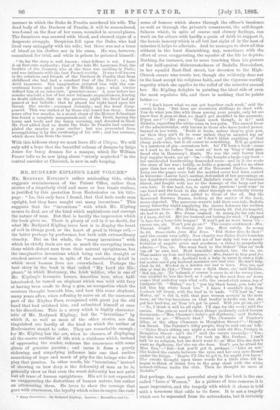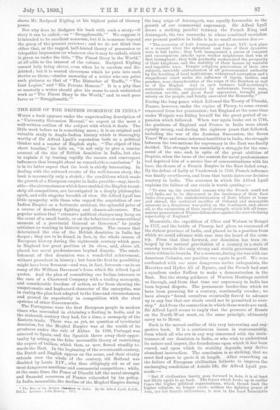MR. RUDYARD KIPLING'S LAST VOLUME.* MN. RGDYAND KIPLING'S rather misleading
title, which suggests reminiscences of the Patent Office, rather than stories of a singularly vivid and more or less tragic realism; is justified by this quotation from Ecclesiastes on his title- page : " Lo, this only have I found, that God hath made man upright, but they have sought out many inventions." This suggests that the "inventions" with which Mr. Kipling means to deal, are of the kind which sophisticate and corrupt the nature of man. But that is hardly the impression which the book gives us. There is plenty of evil in it no doubt, for what Mr. Rudyard Kipling loves best is to display the heart of evil in things good, or the heart of good in things evil,— the latter perhaps by preference, but both with extraordinary vivacity. But on the whole, the "many inventions" with which he chiefly deals are not so much the corrupting inven- tions which distort men from their natural uprightness, but the imaginative inventions which bring out the straight or crooked nature of man in spite of the smothering detail in which most human lives are overwhelmed. Perhaps the best story in the book is that called " My Lord the Ele- phant," in which Mulvaney, the Irish 'soldier, who is one of Mr. Kipling's favourite heroes, describes how, when half- intoxicated, he tamed an elephant which was wild with fury at having been made to drag a gun, an occupation which the creature thought beneath him, and how this same elephant, many years after, when refusing to move on at the narrowest part of the Khyber Pass, recognised with great joy the old hand that had subdued him, and submitted himself at once to his directions. This is a story which is highly character. istic of Mr. Rudyard Kipling; but the "inventions" by which it, as well as most of the other stories, are dis- tinguished are hardly of the kind to which the author of Ecclesiastes meant to refer. They are remarkable enough ; for Mr. Kipling has the art, when he chooses, of displaying all the coarse realities of life with a vividness which, instead of oppressing the reader, redeems the coarseness with some gleam of genuine passion ; and turns it from a purely sickening and stupefying influence into one that excites something of hope and much of pity for the beings who dis- play that passion. In other words, his "inventions," instead of showing us how deep is the deformity of man as he is, generally show us that even the worst deformity has not quite lost all trace of human uprightness. His art is not expended on exaggerating the distortions of human nature, but rather on attenuating them. He loves to show the courage that goes with coarseness, the loyalty which reins-in anger, the rude 4. many Inventions. By iludyard Kipling. London : Macmillan and Co. sense of honour which shows through the officer's insolence as well as through the private's resentment, the self-forget- fulness which, in spite of coarse and clumsy feelings, can work on for others with hardly a grain of faith to support it, the heroic honesty which is all but lost sight of in the host of miseries it helps to alleviate. And he manages to show all this without in the least diminishing, nay, sometimes with the effect of even exaggerating, the squalor of the life he depicts.
Nothing, for instance, can be more touching than his picture of the half-cynical disinterestedness of Badalia Herodsfoot, in her squalid East-End street, her devotion to the High- Church curate who trusts her, though she evidently does not in the least accept his religious faith, and the vigorous worldly sagacity which she applies to the relief of the miseries around her. Mr. Kipling delights in painting the ideal side of even the most repulsive life, and there is nothing that he paints better :— "' I don't know what we can get together each week,' said the curate to her. But here are seventeen shillings to start with. You do what you like with them among your people, only let me know how it goes so that we shan't got muddled in the accounts.
D'you see ? Ho yuss ! 'Taint much though, is it ? said Badalia, regarding the white coins in her palm. The sacred fever of the administrat9r, only known to those who have tasted power,
burned in her veins. Boots is boots, unless they're give you, an' then they ain't fit to wear unless they're mended top an' bottom ; an' jellies is jellies ; an' I don't think anything o' that cheap pork-wine, but it all comes to something. It'll go quicker 'n a quartern of gin—seventeen bob. An' I'll keep a book—same as I used to do before Tom went an' took up 'long o' that pan- faced slut in Hennessy's Rents. We was the only barrer that kep' regular books, me an'—'im2—She bought a large copy-book- her unschooled handwriting demanded room—and in it she wrote the story of her war ; boldly, as befits a general, and for no other eyes than her own and those of the Reverend Eustace Hanna. Long ere the pages were full the mottled cover had boon soaked in kerosene—Lancer Loo's mother, defrauded of her percentage on her daughter's custards, invaded Badalia's room in 17 Gunnison Street, and fought with her to the damage of the lamp and her own hair. It was hard, too, to carry the precious `pork-wine' in one hand and the book in the other through an eternally thirsty land ; so red stains were added to those of the oil. But the Reverend Eustace Hanna, looking at the matter of the book, never objected. The generous scrawls told their own tale, Badalia every Saturday night supplying the chorus between the written statements thus :—Mrs. Hikkey, very ill brandy ad. Cab for hospital, she had to go, is. Mrs. Poone confined. In money for tea (she took it I know, sir) ed. Met her husband out looking for work. 'I slapped 'is face for a bone-idle beggar ! 'E won't get no work becos 'e's- excuse me, sir. Won't you go on ? ' The curate continued—Mrs. Vincent. Covuid. No /inning for baby. Most untidy. In money 2s. ed. Some cloths from Miss Evva. Did Sister Eva do that ?' said the curate very softly. Now charity was Sister Eva's bounden duty, yet to one man's eyes each act of her daily toil was a mani- festation of angelic grace and goodness—a thing to perpetually admire.—`Yes, sir. She went back to the Sisters"Ome an' took 'em off 'er own bed. Most beautiful marked, too. Go on, sir. That makes up four and thruppence.'—Mrs. Junnet to keep good fire coals is up. 7d. Mrs. Lockhart took a baby to nurse to earn a trifle but mother can'd pay husband summons over and over. He won't help. Cash 2s. 2d. Worked in a ketchin but had to leave. Fire, tea, and shin of beef is. %id.= There was a fight there, sir,' said Badalia. Not me, sir. °Er 'usband, o' course 'e come in at the wrong time, was wishful to 'ave the beef, so I calls up the next floor an' down comes that mulatter man what sells the sword-stick canes, top o' Ludgate-'ill. " Muley," sea I, " you big black beast, you, take an' kill this big white beast 'ere." I knew I couldn't stop Tom Lockart 'elf drunk, with the beef in 'is 'ands. "I'll beef 'm," sea Muloy, an' e did it, with that pore woman a-cryin' in the next room, an' the top banisters on that landin' is broke out, but she got her beef-tea, an' Tom'e's got 'is gruel. Will you go on, sir P' No, I think it will be all right. I'll sign for the week,' said the curate. One gets so used to these things profanely called human documents.= Mrs. Churner's baby's got diptheery,' said Badalia, turning to go.—' Where's that ? The Churners of Painter's Alley, or the other Churners in Houghton Street ?'—' Hough- ton Street. The Painter's Alley people, they're sold out an' left.'
Sister Eva's sitting one night a week with old Mrs. Probyn in Houghton Street—isn't she ? ' said the curate uneasily.—' Yes ; but she won't sit no longer. I've took up Mrs. Probyn. I can't talk 'or no religion, but she don't want it; an' Miss Eva she don't want no diptheery, tho' she see she does. Don't you be afraid for Miss Eva.'—' But—but you'll got it, perhaps.'—' Like as not.' She looked the curate between the eyes, and her own oyes flamed under the fringe. Maybe I'd like to get it, for aught you know.' The curate thought upon these words for a little time till he began to think of Sister Eva in the gray cloak with the white bonnet-ribbons under the chin. Then he thought no more of Badalia."
But perhaps the most powerful story in the book is the one called "Love o' Women." As a picture of true remorse it is most impressive, and the tragedy with which it closes is told with a terseness that adds to its force. It is not a tragedy which can be separated from its antecedents, but it certainly shows Mr. Rudyard Kipling at his highest point of literary power.
But why does he disfigure his book with such a story,—if story it can be called,—as " 'Brugglesmitb..' " We suppose it is intended to be excellent nonsense, but it is nonsense beyond the grasp of the present reviewer ; and we do not think that either that, or the ragged, half-hinted theory of possession or telepathic impression (or whatever else it may be called), which is given us under the title, " The Finest Story in the World," at all adds to the interest of the volume. Rudyard Kipling cannot help being clever, even when he is careless and dis- jointed; but it is wasted cleverness which he puts into such stories as these,—stories unworthy of a writer who can paint such pictures as that of " The Disturber of Traffic," " The Lost Legion," and " His Private Honour." It is a pity that so masterly a writer should give his name to such unfinished work as "The Finest Story in the World," and to such poor farce as " Brugglesmith.' "



































 Previous page
Previous page